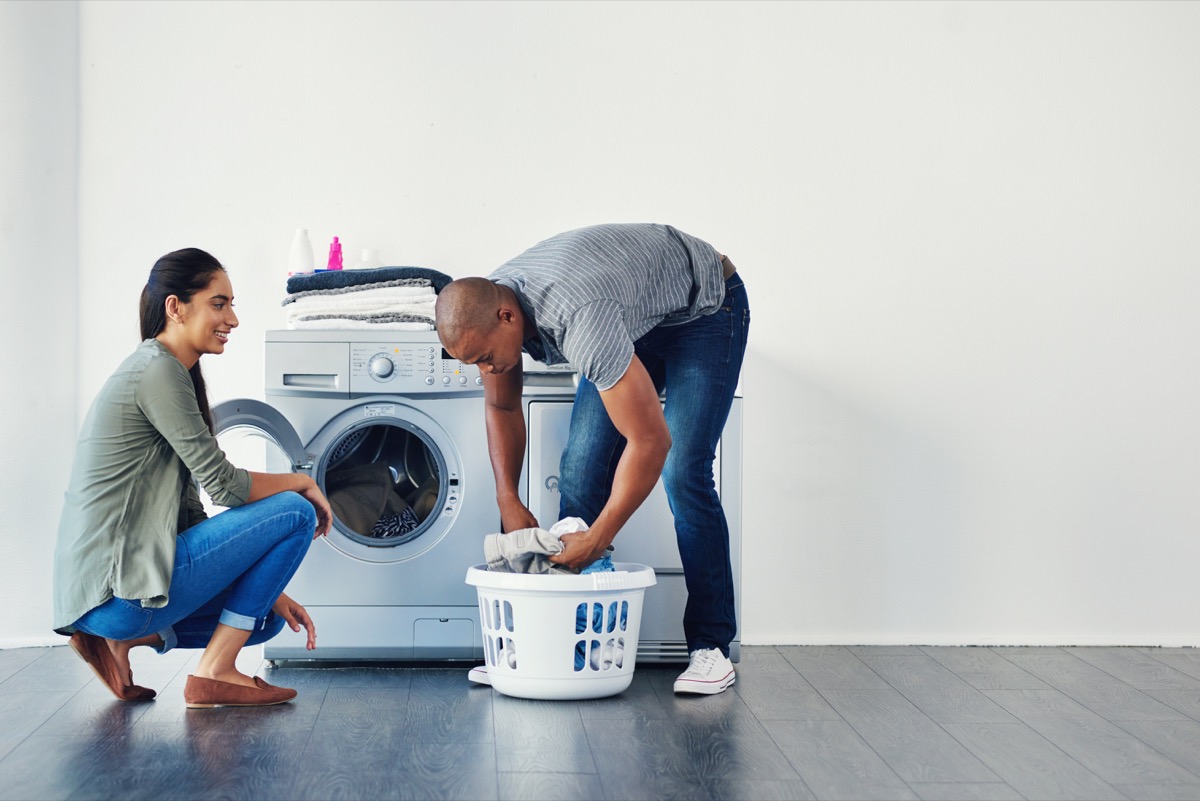Never Clean Your Kitchen Counters With This, Experts Warn

Whether you’re cooking, eating, or serving, a lot of mess can go down in the kitchen. And when it’s time to sweep away crumbs or wipe up spills on your counter, you probably grab whatever is closest to clean up the mess without thinking twice. Unfortunately, that could be causing serious problems. In fact, experts say that there’s one common item you should never clean your kitchen counters with, as it may spread dangerous bacteria around the room. Read on to find out how you could be doing more harm than good when cleaning up your kitchen.
RELATED: You Should Never Clean Your Toilet With This, Experts Warn.
You should never clean your kitchen counters with used dish towels.

When it comes to cleaning your kitchen countertops, avoid reaching for your trusty dish towel to do so. According to Towel Supercenter, dish towels can easily be exposed to dangerous bacteria, so using them for different purposes—like cleaning your kitchen counters—can just spread that bacteria around. While reusable dish towels may seem convenient, you might want to go with a different option for your safety.
“In some scenarios, it may be safest to reach for a disposable paper towel,” the experts at Towel Supercenter explain on their website. “Tossing the paper towel after cleaning the mess helps decrease your chances of spreading bacteria, especially if you don’t throw your reusable towel into the kitchen wash right away.”
RELATED: Never Eat Leftovers That’ve Been in the Fridge This Long, Experts Warn.
Spreading bacteria in the kitchen can give you food poisoning.

Researchers from the University of Mauritius released a study in 2018 describing the health dangers of dish towels. After culturing bacteria from 100 dish towels used for a month, they found that 49 percent of them collected bacterial growth such as E.coli, Enterococcus species, and Staphylococcus aureus. And towels used for more than one purpose—like wiping utensils and cleaning countertops—had a higher bacterial count than towels that were only used for one activity. “Those are bacteria that are concerns for foodborne illnesses,” Paul Dawson, PhD, a food scientist and professor in the College of Agriculture, Forestry and Life Sciences at Clemson University, explained to CNN.
Common symptoms of food poisoning include upset stomach, stomach cramps, nausea, vomiting, diarrhea, and fever, and can be anywhere from mild to very serious, according to the Centers for Disease Control and Prevention (CDC). If you experience bloody diarrhea, high fever, frequent vomiting, signs of dehydration, or diarrhea that lasts more than three days, you should see a doctor immediately, as food poisoning can result in long-term health problems or even death, per the CDC.
More than half of people admit to cleaning their countertops with dish towels.

A March 2021 Bounty survey of cleaning behaviors among 2,000 people in the U.S. found that 58 percent of respondents use dish towels to clean up messes or spills on their kitchen counters. And despite 18 percent of respondents saying they are aware that kitchen dish towels are one of the dirtiest items in the house, 41 percent still said they will reuse a dish towel more than five times before washing it.
“Used dishcloths can provide a flourishing environment for bacteria,” Jessica Rivera, MS, an infectious disease expert, said in statement accompanying the survey. “And what many do not realize is, when you wipe up a mess or dry your hands with a used, reusable cloth, you may be helping to spread bacteria.”
RELATED: For more cleaning advice delivered straight to your inbox, sign up for our daily newsletter.
You should be changing and washing your dish towels frequently.

Only 11 percent of people in the U.S. say they replace or clean their kitchen hand towel more than once a week, according to the survey. But the U.S. Department of Agriculture (USDA) acknowledges that kitchen dish cloths are “potential sources of bacteria,” which means they should be changed and washed more frequently than that.
Of course, how frequently each household should be washing their dish towels depends on a few different factors, per the Institute of Agriculture and Natural Resources at the University of Nebraska, Lincoln. This includes how often they are used and what they’re used for in the kitchen. If your towel is used to clean up anything that can contribute to bacteria growth, like raw meat, poultry, or seafood juices, it should be washed and replaced with a new one immediately. The USDA recommends that you wash dish towels in the hot cycle of your washing machine.
RELATED: 40 Percent of People Only Wash This Clothing Item Once a Year, Survey Says.